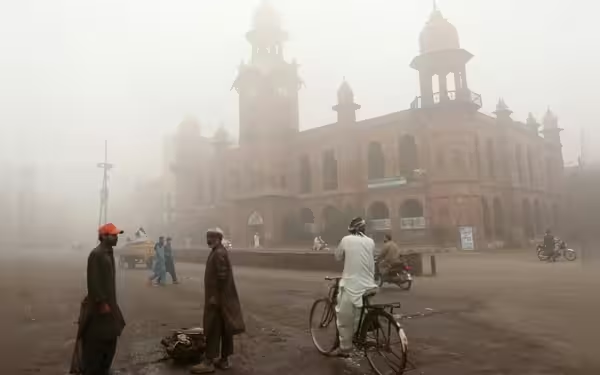Wednesday, January 15, 2025 10:32 AM
Pakistan's Urgent Battle Against Smog Crisis
- Pakistan faces severe air pollution and smog challenges.
- Government efforts to combat smog remain insufficient.
- Learning from Europe can improve Pakistan's air quality.
 Image Credits: tribune.com.pk
Image Credits: tribune.com.pkPakistan is grappling with a severe smog crisis, necessitating urgent action for improved air quality and public health.
Pakistan is currently facing a significant challenge with air pollution and smog, particularly during the dry and cold months from November to January. This period sees a sharp increase in smog levels, which can severely affect the health of the population and the environment. The situation has become alarming, as many cities in Pakistan are now among the most polluted in the world. The combination of industrial emissions, vehicle exhaust, and crop burning contributes to this growing crisis.
In contrast, countries in Europe have implemented strict air quality standards and continuous monitoring systems that have proven effective in reducing smog levels. These measures include regular assessments of air quality, strict regulations on emissions from factories and vehicles, and public awareness campaigns to educate citizens about the importance of clean air. Such proactive approaches have led to a noticeable improvement in air quality, showcasing that effective policies can lead to positive outcomes.
In Pakistan, however, the response to the smog crisis has been less effective. Many citizens are left to deal with the consequences of poor air quality, which can lead to serious health issues such as respiratory problems and heart diseases. The government has made some efforts to address the issue, but these measures often fall short of what is needed to make a significant impact. For instance, the enforcement of existing laws regarding emissions is often weak, and public awareness about the dangers of smog remains limited.
To combat the growing smog problem, it is essential for Pakistan to adopt a more comprehensive approach. This could include stricter regulations on industrial emissions, promoting the use of public transport, and encouraging the use of cleaner energy sources. Additionally, educating the public about the sources and effects of air pollution can empower citizens to take action in their own communities.
While the smog crisis in Pakistan poses a serious threat to public health and the environment, it is not insurmountable. By learning from the successful strategies employed in other countries, Pakistan can take meaningful steps towards improving air quality. It is crucial for both the government and the public to work together to create a cleaner, healthier future for all. After all, clean air is not just a luxury; it is a fundamental right that every citizen deserves.













